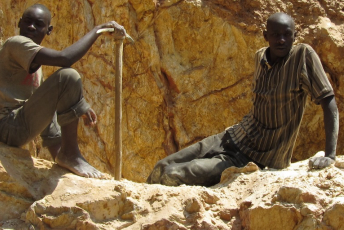Tourism is the Canary Islands’ main economy. The islands welcome 12 million visitors annually, with the sector making up 32% of the country’s gross domestic product (GDP). Enormous quantities of sand are needed to build amenities, hotels and housing for the industry. However, the islands do not extract their own sand because of a burdensome bureaucracy that makes it complicated and costly for local Spanish companies to buy it. So these building companies source their sand from Western Sahara instead.
In the past 20 years, revamping beaches and large-scale construction has resulted in millions of tonnes of sand being imported. It is estimated that at least 750 000 tonnes were illegally extracted from Western Sahara and transported to the Canary Islands between 2012 and 2017. From October 2019 to December 2020 alone, about 191 000 tonnes of sand were exploited from this occupied territory. This is according to Associaciones de Amistad y Solidaridad con el Pueblo Saharaui de Canarias (AASPSC) – a Spanish non-governmental organisation that monitors the illicit extraction of natural resources from Western Sahara.
This sand extraction has numerous consequences for Western Sahara and its people. Economically, it is primarily the Moroccan authorities and companies who benefit from this trade. Environmentally, such extraction disfigures the landscape, as it does elsewhere in the world, and erodes sensitive ecologies. And crucially, unless the Sahrawi authorities and their people consent to the extraction of natural resources from their territory, this sand extraction is illegal.
The Court of Justice of the European Union (EU) has ruled that any agreements between the EU and Morocco cannot be legally extended to Western Sahara. The only exceptions are those agreements that have the explicit approval of the people of the territory and which aim to benefit the immediate needs of the original Saharawi population.
The rulings state that Rabat has neither sovereignty over Western Sahara nor any international mandate to administer it. They were further confirmed by the 2002 Legal Opinion of the United Nations Legal Counsel, which emphasised that the exploration and exploitation of natural resources could only be conducted in Western Sahara in compliance with international law.
Despite these rulings, and facilitated by both Moroccan and local Spanish authorities, Spanish companies based in the Canary Islands have been importing sand illegally extracted from Western Sahara for years, ignoring the international law related to its natural resources.
There are several reasons for this. In Las Palmas (Canary Islands), a tonne of sand is estimated to cost €14. In Laayoune (Western Sahara) it is only €3. For each tonne, the Sahrawi region’s council – governed by Moroccan authorities – receives 2.5 dirhams (€0.23), the Moroccan Office d’Exploitation des Ports receives 11 dirham (€1) and the Commune Rurale of Foum El Oued receives 3 dirham (€0.28). And so Moroccan authorities and companies benefit financially.
The lack of traceability further facilitates this illegal trade. As it stands, the imported aggregates come with a European Conformity (CE) marking – indicating that the sand is of European origin. The seal that appears on the sand packages of the Tenerife company Áridos del Valle classifies the product as Sand of the Sahara (Milan) only. The company emphasises that it does not import the product itself, but buys it locally and then bags it.
One of the Spanish companies involved in the illegal sand trade is Yesos Canarias SA, which imported 153 300 tonnes of sand over the period monitored by AASPSC. Yesos Canarias SA is part of a conglomerate that includes, among others, the Arabella Enterprise Corporation, a shipping company based in Las Palmas de Gran Canaria.
The Arabella Enterprise Corporation, cited by AASPSC as being involved in the transnational traffic of aggregates, owns the Dura Bulk, a cargo ship known for transporting sand between Western Sahara and the Canary Islands.
SODECAN, a public governmental entity of the Canary Islands, owns 22.73% of Yesos Canarias SA’s shares. It is therefore unlikely that SODECAN is unaware of Yesos’s Western Sahara sand trading activities.
The port of Laayoune, under the de facto authority of Morocco, is the main sand trading partner of the port of Las Palmas. According to data provided by the Department of Foreign Trade of the Chamber of Commerce of Santa Cruz de Tenerife, 43 000 tonnes of sand were imported to Tenerife alone in 2016. Despite this close trading partnership, says Cabinet Adviser of Gran Canaria Carmelo Ramirez, Spanish port authorities do not check the custom procedures of sand importation. They leave it to the Moroccan authorities in Laayoune.
The illegal sand trade between the occupied Western Sahara territory and the Canary Islands continues because international laws are disregarded by companies and government authorities alike. Were the laws to be upheld, companies found culpable of infringing the law would be heavily sanctioned. Indeed, as Spain is a member state of the EU, and therefore subject to the EU’s laws, Spanish and regional Canarian authorities would stand to be penalised by the same EU jurisdiction. This is yet to happen.
Likewise, companies that have been cited in different reports as being suspected of infringing the law are at risk of being fined due to their illegal commercial activities entailing Western Sahara. These include Eemswerken, Anfi Tauro Group, Lafarge-Holcim, Cemex, Heidelberg, CRH, Sibelco, and Yesos Canarias SA. These companies operate freely from all accounts.
In 2018, the South African High Court issued a final ruling on a shipment of phosphates held in Port Elizabeth since May 2017. The court found that the shipment belonged to the Sahrawi Republic, confirming that Morocco never had any ownership over Sahrawi phosphate.
Such a ruling could serve as an example of what may be applied by all countries on all other natural resources extracted from Western Sahara. A possible consequence here is that the Moroccan authorities would have no market to sell sand illegally extracted from this occupied territory. Such a unified response seems unlikely given the current practices.
Finally, Canarian authorities are continuing with bureaucratically cumbersome processes that prevent local companies from extracting and buying sand locally. Without a change here, and together with the disregard for the law, Spanish companies will continue to import sand from Western Sahara.
To stop this illegal sand plundering requires respect for laws across jurisdictions, matched by robust accountability. Yet is clear that doing so is complex as criminal enterprises optimise this political context.
Abdelkader Abderrahmane, Senior Researcher, ENACT Project, ISS Regional Office for West Africa, the Sahel and the Lake Chad Basin








